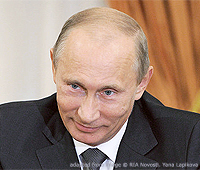RIA Novosti: Putin Praises Russia’s ‘Liberal’ NGO Legislation

(RIA Novosti – NOVO-OGARYOVO, June 14, 2013) Russian legislation regarding non-governmental organizations is far more liberal that of other countries, President Vladimir Putin said Friday, in an implicit response to Western criticism that recent Russian legislation on NGOs is too restrictive.
“Our legislation is more liberal,” he said in Moscow at a meeting of the Civil 20, the arm of the Group of 20 major economies that deals with civil society.
“In the United States, any organization that works in any area and receives money from abroad … is supposed to register as a foreign agent. In our country, [that concerns] only organizations that are engaged in domestic political activity.”
That does not apply to organizations working in healthcare, environmental protection or municipal activity: “There are absolutely no limitations there,” he said. “I want you to remember that and work in Russia as actively as you can, providing assistance to your partners in Russia.”
“The only thing is that organizations that engage in domestic political activity and to which you give money need to register. Their activity is not prohibited.”
At the same time it is essential “to analyze the practical application of that legislation and think about ways of improving it” so that the state has no suspicions about the activity of individual organizations and no one interferes in their activity, Putin said.
“And we will work along those lines, including with the participation of representatives of civil society,” he added.
Earlier on Friday a Moscow court upheld fines imposed on the Golos Association, an independent election-monitoring NGO, because the organization engaged in political activity and received more than 4 million rubles (about $128,000) from foreign sources last year but did not register as a “foreign agent,” a stipulation of the new registration requirement enacted in November.
Golos was fined 300,000 rubles (about $10,000), and its director Lilia Shibanova an additional 100,000 rubles. The group said it would appeal the ruling in the European Court of Human Rights.
